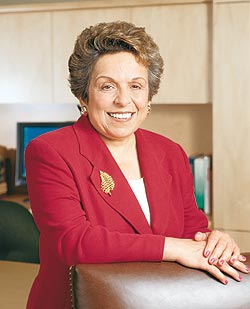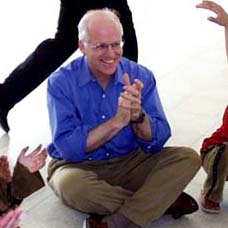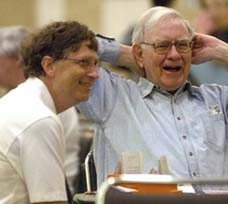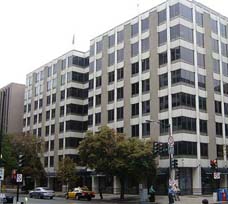1998.03.18: March 18, 1998: Headlines: Figures: COS - Iran: University Administration: Health and Human Resources: Donna Shalala says: I should confess that my family originally opposed my decision to join the Peace Corps. My dad even offered me a car as a bribe to keep me away.
Peace Corps Online:
Directory:
Iran:
Special Report: Iran RPCV, Cabinet Member, and University President Donna Shalala:
February 9, 2005: Index: PCOL Exclusive: RPCV Donna Shalala (Iran) :
1998.03.18: March 18, 1998: Headlines: Figures: COS - Iran: University Administration: Health and Human Resources: Donna Shalala says: I should confess that my family originally opposed my decision to join the Peace Corps. My dad even offered me a car as a bribe to keep me away.
Donna Shalala says: I should confess that my family originally opposed my decision to join the Peace Corps. My dad even offered me a car as a bribe to keep me away.

My Lebanese grandmother, however, finally settled the issue. "Donna," she said, "is going to the old country-she'll be fine." As I left for Iran, she pressed into my hand a letter written in classical Arabic. "Give this to the head man in the village," she whispered. When I arrived in Moli Sani, a small village in Iran, I gave the letter to the local mullah. It turned out that my grandmother had written the following in her note: "This is to introduce the daughter of a great sheikh in Cleveland, Ohio. Please put her under your protection." Like the rest of my family, the wise mullah took my grandmother's advice.
Donna Shalala says: I should confess that my family originally opposed my decision to join the Peace Corps. My dad even offered me a car as a bribe to keep me away.
Testimony on The Peace Corps: 10,000 Volunteers by the Year 2000 by The Honorable Donna Shalala
Secretary
U.S. Department of Health and Human Services
Before the House International Relations Committee
March 18, 1998
Mr. Chairman, I am honored to appear before you today to support President Clinton's budget request for the Peace Corps. I appreciate having the opportunity to join Peace Corps Director Mark Gearan, former Peace Corps Director, Senator Paul Coverdell, and five able Members of Congress to urge this Committee to help make it possible for more Americans to serve our country and the world as Peace Corps volunteers.
Some Members of the Committee may wonder why the Secretary of Health and Human Services is testifying before the House Committee on International Relations on behalf of a small foreign assistance agency.
That's a fair question. The reason I am here, Mr. Chairman, is that like Representatives Shays, Farr, Walsh, Hall, and Petri, who testified here earlier, I proudly served as a Peace Corps volunteer. I believe that of all the programs our government supports, the Peace Corps ranks among the most effective.
I still think of myself as a Peace Corps volunteer. My service in Iran from 1962-1964 was one of the most important experiences of my youth. The opportunity to serve as a volunteer in another country, to study another language, to become immersed in another culture and, at the same time, to make a contribution to people had an enormous impact on me, one that shaped the way I view the world and myself. I like to think that in some small way I helped the people of Iran gain a better understanding of what Americans are like.
Let me explain briefly how.
The Peace Corps experience began for me in the spring of my senior year of college. I remember walking across my beautiful, small, Midwestern college campus in southern Ohio wondering whether I should go to law school, work in Washington or join the Peace Corps. Ultimately, the decision was easy. I was a child of my generation, and the Peace Corps offered the opportunity for an extraordinary adventure while serving my country.
I should confess that my family originally opposed my decision to join the Peace Corps. My dad even offered me a car as a bribe to keep me away. My Lebanese grandmother, however, finally settled the issue. "Donna," she said, "is going to the old country-she'll be fine." As I left for Iran, she pressed into my hand a letter written in classical Arabic. "Give this to the head man in the village," she whispered.
When I arrived in Moli Sani, a small village in Iran, I gave the letter to the local mullah. It turned out that my grandmother had written the following in her note: "This is to introduce the daughter of a great sheikh in Cleveland, Ohio. Please put her under your protection." Like the rest of my family, the wise mullah took my grandmother's advice.
I was assigned to teach at the Agricultural College at Ahwaz, and it was a challenge. At our first faculty meeting, the Dean went around the room and called the names of all the men, including the male Peace Corps Volunteers. He skipped me. I went to see him in his office and asked him why he hadn't called my name. He said that he didn't know what to say. He had no experience with female teachers. The dean eventually began calling on me at faculty meetings, however, and the male students, while they still stuck weird things in my teacher's desk, became much more respectful.
The day that I remember most vividly was the day after President Kennedy was assassinated in November 1963, about half way through my service in the Peace Corps. Depressed at the death of the President who had inspired us to serve, some friends and I were not in the mood to deal with the local beggar when he approached us. But then with a sad smile, he said, "No money. I want to tell you how sad we all are that your young president was assassinated." I was so moved. There, in a remote town halfway around the world, a very sad young Peace Corps volunteer and a poor Iranian beggar embraced, together mourning the death of President John F. Kennedy.
Years later, looking back at my Peace Corps service, I realized that a wise Mullah, an insensitive dean, and students struggling to preserve a traditional society in a modern age had changed me forever. I had become a citizen of the world. Because of the Peace Corps, I was sensitive to cultural differences, comfortable sitting on mud floors talking to tribal leaders, and respectful of the role of religion. I also came to better appreciate the daily struggles of desperately poor people who, in the face of enormous challenges, manage to maintain their sense of dignity and care for their children.
Those were very special years for me. My Peace Corps experience helped to prepare me for my service as Assistant Secretary of Housing and Urban Development, President of Hunter College, and Chancellor of the University of Wisconsin-Madison. Even today, as the Secretary of Health and Human Services, the skills that I learned to be a successful Peace Corps volunteer --patience, flexibility, determination, cross-cultural sensitivity, and a sense of humor -- continue to influence the way I carry out my duties.
Mr. Chairman, I can only offer you my own perspective about the Peace Corps. But as I travel across this extraordinary country and around the world, as I talk with health professionals, social workers, teachers, and people from every walk of life, I become more convinced that the Peace Corps experience is more important than ever.
As Members of this Committee know, we live in a world that changes much faster than we sometimes wish. We live in a world that is shaped not only by the competition of the global economy, but also by the exchange of ideas. We live in a world that requires us to understand and appreciate people of vastly different backgrounds, languages, and cultures if we hope to remain competitive in the next century. And there are few, if any, other programs -- public or private --that can better prepare our citizens for the world than the Peace Corps.
A few months ago, I had the chance to visit with some Peace Corps volunteers in Thailand who are doing important work in AIDS education. I was reminded of my time as a volunteer in Iran, now 35 years ago. I could see the dedication and professionalism that they brought to their jobs, and the impact that serving as a Peace Corps volunteer was having on them. I left Thailand proud that our government sponsors such a program and convinced that we should do all that we can to open this experience to more of our fellow citizens.
President Clinton has asked Congress to join in a bipartisan effort to make it possible for 10,000 Peace Corps volunteers to serve overseas by the year 2000. Under the leadership of Director Mark Gearan, the Peace Corps is prepared to meet this great challenge. Entering the next century with such a legacy of service would be an enormous achievement for all Americans. The increase in funding that President Clinton has requested for the Peace Corps can only be seen as an investment in the future of our people and our nation. By opening up the Peace Corps to more of our citizens, we will be stronger and the world will have a better understanding of our country.
Again, Mr. Chairman, I urge you and the distinguished Members of this Committee to support the President's budget request for the Peace Corps.
Thank you.
When this story was posted in September 2006, this was on the front page of PCOL:





Peace Corps Online The Independent News Forum serving Returned Peace Corps Volunteers
 | Chris Shays Shifts to Favor an Iraq Timetable
In a policy shift, RPCV Congressman Chris Shays, long a staunch advocate of the Bush administration's position in Iraq, is now proposing a timetable for a withdrawal of American troops. How Mr. Shays came to this change of heart is, he says, a matter of a newfound substantive belief that Iraqis need to be prodded into taking greater control of their own destiny under the country’s newly formed government. As Chairman of the House Government Reform subcommittee on national security, he plans to draft a timetable for a phased withdrawal and then push for its adoption. A conscientious objector during the Vietnam War who said that if drafted he would not serve, Chris Shays has made 14 trips to Iraq and was the first Congressman to enter the country after the war - against the wishes of the Department of Defense. |
 | Peace Corps' Screening and Medical Clearance
The purpose of Peace Corps' screening and medical clearance process is to ensure safe accommodation for applicants and minimize undue risk exposure for volunteers to allow PCVS to complete their service without compromising their entry health status. To further these goals, PCOL has obtained a copy of the Peace Corps Screening Guidelines Manual through the Freedom of Information Act (FOIA) and has posted it in the "Peace Corps Library." Applicants and Medical Professionals (especially those who have already served as volunteers) are urged to review the guidelines and leave their comments and suggestions. Then read the story of one RPCV's journey through medical screening and his suggestions for changes to the process. |
 | Gates charity races to spend billions
Warren E. Buffett’s gift of $31 billion to the Bill and Melinda Gates Foundation means that for tax reasons, starting in 2009, the foundation must distribute $3 billion annually, or a little more than twice what it distributed last year.
PCOL Comment: The Foundation says that "preventing the spread of HIV is the most durable long-term solution to the AIDS epidemic, and a top priority for the foundation." Peace Corps Volunteers and Returned Volunteers have been doing just that in AIDS Education for the past 15 years. Why not consider a $100M annual contribution to the Peace Corps to put 2,500 additional volunteers in the field to expand AIDS education worldwide? |
 | The Peace Corps is "fashionable" again
The LA Times says that "the Peace Corps is booming again and "It's hard to know exactly what's behind the resurgence." PCOL Comment: Since the founding of the Peace Corps 45 years ago, Americans have answered Kennedy's call: "Ask not what your country can do for you--ask what you can do for your country. My fellow citizens of the world: ask not what America will do for you, but what together we can do for the freedom of man." Over 182,000 have served. Another 200,000 have applied and been unable to serve because of lack of Congressional funding. The Peace Corps has never gone out of fashion. It's Congress that hasn't been keeping pace. |
 | Changing the Face of Hunger
In his new book, Former Congressman Tony Hall (RPCV Thailand) says humanitarian aid is the most potent weapon the United States can deploy against terrorism. An evangelical Christian, he is a big believer in faith-based organizations in the fight against hunger. Members of Congress have recently recommended that Hall be appointed special envoy to Sudan to focus on ending the genocide in Darfur. |
 | PC will not return to East Timor in 2006
Volunteers serving in East Timor have safely left the country as a result of the recent civil unrest and government instability. Latest: The Peace Corps has informed us that at this time, the Peace Corps has no plans to re-enter the country in 2006. The Peace Corps recently sent a letter offering eligible volunteers the opportunity to reinstate their service in another country. |
 | Chris Dodd considers run for the White House
Senator Chris Dodd plans to spend the next six to eight months raising money and reaching out to Democrats around the country to gauge his viability as a candidate. Just how far Dodd can go depends largely on his ability to reach Democrats looking for an alternative to Hillary Clinton. PCOL Comment: Dodd served as a Volunteer in the Dominican Republic and has been one of the strongest supporters of the Peace Corps in Congress. |
 | Peace Corps stonewalls on FOIA request
The Ashland Daily Tidings reports that Peace Corps has blocked their request for information on the Volkart case. "After the Tidings requested information pertaining to why Volkart was denied the position — on March 2 — the newspaper received a letter from the Peace Corps FOIA officer stating the requested information was protected under an exemption of the act." The Dayton Daily News had similar problems with FOIA requests for their award winning series on Volunteer Safety and Security. |
 | PCOL readership increases 100%
Monthly readership on "Peace Corps Online" has increased in the past twelve months to 350,000 visitors - over eleven thousand every day - a 100% increase since this time last year. Thanks again, RPCVs and Friends of the Peace Corps, for making PCOL your source of information for the Peace Corps community. And thanks for supporting the Peace Corps Library and History of the Peace Corps. Stay tuned, the best is yet to come. |
 | History of the Peace Corps
PCOL is proud to announce that Phase One of the "History of the Peace Corps" is now available online. This installment includes over 5,000 pages of primary source documents from the archives of the Peace Corps including every issue of "Peace Corps News," "Peace Corps Times," "Peace Corps Volunteer," "Action Update," and every annual report of the Peace Corps to Congress since 1961. "Ask Not" is an ongoing project. Read how you can help. |
 | RPCV admits to abuse while in Peace Corps
Timothy Ronald Obert has pleaded guilty to sexually abusing a minor in Costa Rica while serving there as a Peace Corps volunteer. "The Peace Corps has a zero tolerance policy for misconduct that violates the law or standards of conduct established by the Peace Corps," said Peace Corps Director Gaddi H. Vasquez. Could inadequate screening have been partly to blame? Mr. Obert's resume, which he had submitted to the Peace Corps in support of his application to become a Peace Corps Volunteer, showed that he had repeatedly sought and obtained positions working with underprivileged children. Read what RPCVs have to say about this case. |
 | Why blurring the lines puts PCVs in danger
When the National Call to Service legislation was amended to include Peace Corps in December of 2002, this country had not yet invaded Iraq and was not in prolonged military engagement in the Middle East, as it is now. Read the story of how one volunteer spent three years in captivity from 1976 to 1980 as the hostage of a insurrection group in Colombia in Joanne Marie Roll's op-ed on why this legislation may put soldier/PCVs in the same kind of danger. Latest: Read the ongoing dialog on the subject. |
Read the stories and leave your comments.

Some postings on Peace Corps Online are provided to the individual members of this group without permission of the copyright owner for the non-profit purposes of criticism, comment, education, scholarship, and research under the "Fair Use" provisions of U.S. Government copyright laws and they may not be distributed further without permission of the copyright owner. Peace Corps Online does not vouch for the accuracy of the content of the postings, which is the sole responsibility of the copyright holder.
Story Source: Health and Human Resources
This story has been posted in the following forums: : Headlines; Figures; COS - Iran; University Administration
PCOL34385
47
























